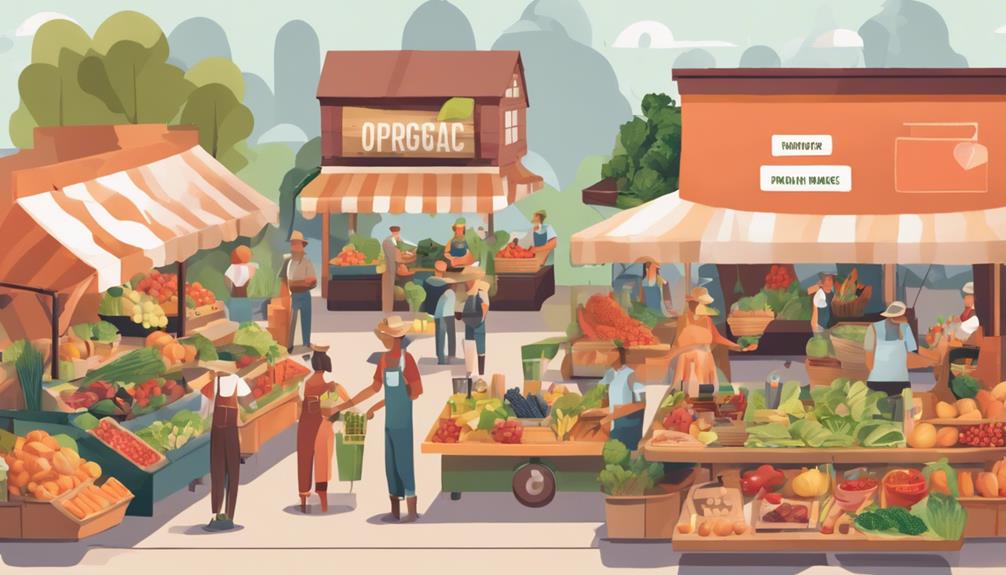Why Choose Organic Food: Consumer Benefits Uncovered?
Choosing organic food offers you numerous advantages. Organic farming practices enhance disease prevention by avoiding harmful chemicals linked to cancer and antibiotic resistance. By consuming organic food, you reduce exposure to pesticides and boost your immune system with higher levels of essential nutrients. Additionally, organic farming has a lower environmental impact, promotes sustainable agriculture, and ensures a pesticide-free eating experience. The nutritional value of organic produce is enhanced through better soil quality. Selecting organic options not only benefits your health but also supports ethical animal welfare practices. Embrace the benefits of organic food for a wholesome, sustainable lifestyle.
Health Benefits of Organic Food
Organic food offers numerous health benefits that can positively impact your overall well-being. When it comes to disease prevention, organic farming practices play a crucial role. Unlike conventional farming, organic methods avoid the use of synthetic pesticides, hormones, and antibiotics. These chemicals have been linked to various health issues, including cancer, hormonal imbalances, and antibiotic resistance. By choosing organic food, you reduce your exposure to these harmful substances, thus lowering the risk of developing such diseases.
Moreover, organic food consumption can boost your immune system. Research indicates that organic fruits, vegetables, and grains contain higher levels of antioxidants and essential nutrients compared to their conventionally grown counterparts. These antioxidants help combat oxidative stress in the body, reducing the risk of chronic diseases and supporting overall immune function. Additionally, organic livestock raised without antibiotics may help prevent the development of antibiotic-resistant bacteria in consumers, further safeguarding your health.
Environmental Impact of Organic Farming
Considering the current agricultural landscape, it becomes evident that organic farming practices have a significantly lower environmental impact compared to conventional methods.
One of the key ways in which organic farming contributes to a healthier environment is through the reduced carbon footprint it generates. Organic farms tend to use less energy overall, as they avoid synthetic fertilizers and pesticides that require substantial energy to produce. Additionally, organic farming promotes practices like crop rotation and composting, which help sequester carbon in the soil rather than releasing it into the atmosphere as carbon dioxide.
Furthermore, organic farming is known to prioritize soil health, which is crucial for sustaining agricultural productivity in the long term. By avoiding synthetic chemicals and focusing on natural soil amendments, organic farmers help maintain the soil's structure, fertility, and biodiversity. Healthy soils not only support higher yields and better crop resilience but also play a vital role in carbon sequestration, thus aiding in the fight against climate change.
Pesticide-Free Eating Experience
When opting for organic food, consumers can enjoy a pesticide-free eating experience that prioritizes health and sustainability. Organic farming practices prohibit the use of synthetic pesticides and fertilizers, ensuring that the food you consume is free from harmful chemicals. This commitment to natural ingredients sets organic food apart, offering a clean eating experience that promotes overall well-being.
Choosing organic products allows you to minimize your exposure to pesticides commonly found in conventionally grown fruits, vegetables, and other food items. Studies have shown that pesticides can have adverse effects on human health, ranging from respiratory issues to potential long-term impacts on neurological functions. By opting for organic options, you can reduce these risks and enjoy a diet that's free from such harmful substances.
Moreover, supporting organic farming practices encourages sustainability and environmental conservation. By avoiding the use of synthetic chemicals, organic farmers promote biodiversity in the soil and protect water quality. This holistic approach not only benefits your health but also contributes to the preservation of ecosystems for future generations.
In essence, the pesticide-free eating experience offered by organic food aligns with a natural and clean eating philosophy. By making conscious choices about the food you consume, you not only prioritize your health but also support sustainable agricultural practices that benefit both you and the environment.
Nutritional Value of Organic Produce
Minimizing exposure to pesticides by choosing organic food also opens the door to exploring the nutritional value of organic produce. Organic farming practices prioritize soil quality, which plays a crucial role in enhancing the nutrient density of crops. Studies have shown that organic fruits and vegetables tend to have higher levels of essential vitamins, minerals, and antioxidants compared to conventionally grown produce. This nutrient-dense nature of organic food can offer you a more wholesome eating experience, contributing to your overall health and well-being.
Furthermore, opting for organic produce reduces the risk of chemical residue in your food, thus enhancing food safety. Conventionally grown crops often contain pesticide residues, which can have adverse effects on human health when consumed over time. By choosing organic options, you can minimize your exposure to these harmful chemicals and enjoy a more natural and pure form of food.
Support for Sustainable Agriculture
Support for Sustainable Agriculture is crucial in ensuring the long-term viability of our food systems and environmental health. Organic farming practices focus on soil regeneration, which is essential for maintaining the health of the land. Unlike conventional agriculture that often relies on synthetic fertilizers and pesticides that degrade soil quality over time, organic farming emphasizes the use of compost, cover crops, and crop rotation to replenish nutrients and enhance soil structure. By supporting sustainable agriculture, you contribute to the preservation and improvement of our soil resources for future generations.
Another significant aspect of sustainable agriculture is biodiversity preservation. Organic farming methods promote a diverse range of plant and animal species, creating a balanced ecosystem that's more resilient to pests, diseases, and environmental changes. This biodiversity is crucial for pollination, natural pest control, and overall ecosystem stability. By choosing organic food produced through sustainable practices, you're supporting the protection of wildlife habitats and promoting a healthier environment.
Enhanced Flavor and Freshness
Choosing organic food can lead to enhanced flavor and freshness due to the unique farming practices employed in organic agriculture. When you opt for organic products, you aren't just choosing a healthier option but also one that tantalizes your taste buds and ensures farm-to-table freshness. Here are four reasons why organic food stands out in terms of taste sensations and freshness:
- Soil Health: Organic farming focuses on building healthy, fertile soil through practices like crop rotation and composting. This nutrient-rich soil translates into flavorful produce that's rich in essential minerals, resulting in a more vibrant taste experience for you.
- Pesticide-Free: Organic farming prohibits the use of synthetic pesticides and herbicides. By avoiding these chemicals, organic fruits and vegetables develop their natural flavors without any residues that could affect taste. You get to enjoy the pure, unadulterated essence of each bite.
- Seasonal Variability: Organic farming embraces the natural rhythm of the seasons. This means that organic produce is often harvested at its peak ripeness, ensuring optimal flavor and freshness. You can savor the true essence of each fruit and vegetable as intended by nature.
- Shorter Supply Chains: Organic food often travels shorter distances from farm to table compared to conventional produce. This shorter supply chain reduces the time between harvest and consumption, preserving the freshness and flavor of the organic products you enjoy.
Transparency in Food Production

When considering the consumer benefits of choosing organic food, understanding the transparency in food production becomes paramount. Organic food offers consumers a clear view of the supply chain, giving insight into how the food was grown, processed, and distributed. This transparency ensures that consumers can make informed decisions about the products they purchase.
One key aspect of transparency in organic food production is the stringent labeling requirements. Organic food labels provide essential information about the product, such as whether it's certified organic, free from synthetic pesticides, hormones, or genetically modified organisms. By having clear labeling requirements, consumers can easily identify organic products and understand the standards they meet.
Moreover, transparency in the supply chain of organic food allows consumers to trace the journey of their food from farm to table. This visibility fosters trust between consumers and producers, ensuring that organic standards are upheld throughout the entire production process.
Contribution to Animal Welfare
The organic food industry's commitment to animal welfare is evident through stringent standards and practices that prioritize the well-being of livestock. When you choose organic food, you're supporting ethical farming practices that respect animal rights. Here's how organic food contributes to animal welfare:
- Space and Freedom: Organic farming mandates that animals have ample space to move around freely. This ensures that they can engage in natural behaviors and live a less stressful life compared to animals in conventional farming systems.
- No Routine Antibiotics or Hormones: In organic farming, the use of antibiotics and hormones for promoting growth or preventing disease is prohibited unless medically necessary. This reduces the risk of antibiotic resistance and ensures that animals aren't subjected to unnecessary medication.
- Access to Outdoor Areas: Organic standards require that animals have access to outdoor areas, allowing them to graze on grass and engage in natural behaviors. This contributes to their overall well-being and happiness.
- Humane Slaughtering Practices: When it comes time for animals to be slaughtered, organic regulations prioritize humane practices to minimize pain and suffering. This demonstrates a commitment to treating animals ethically throughout their lives, even at the end of their journey.
Conclusion
In conclusion, choosing organic food offers a range of benefits that go beyond just personal health. From supporting sustainable agriculture practices to reducing exposure to harmful pesticides, opting for organic produce can have a positive impact on your well-being and the environment.
With its superior nutritional value, enhanced flavor, and commitment to animal welfare, organic food is a smart choice for conscious consumers looking to make a positive difference in the world.
